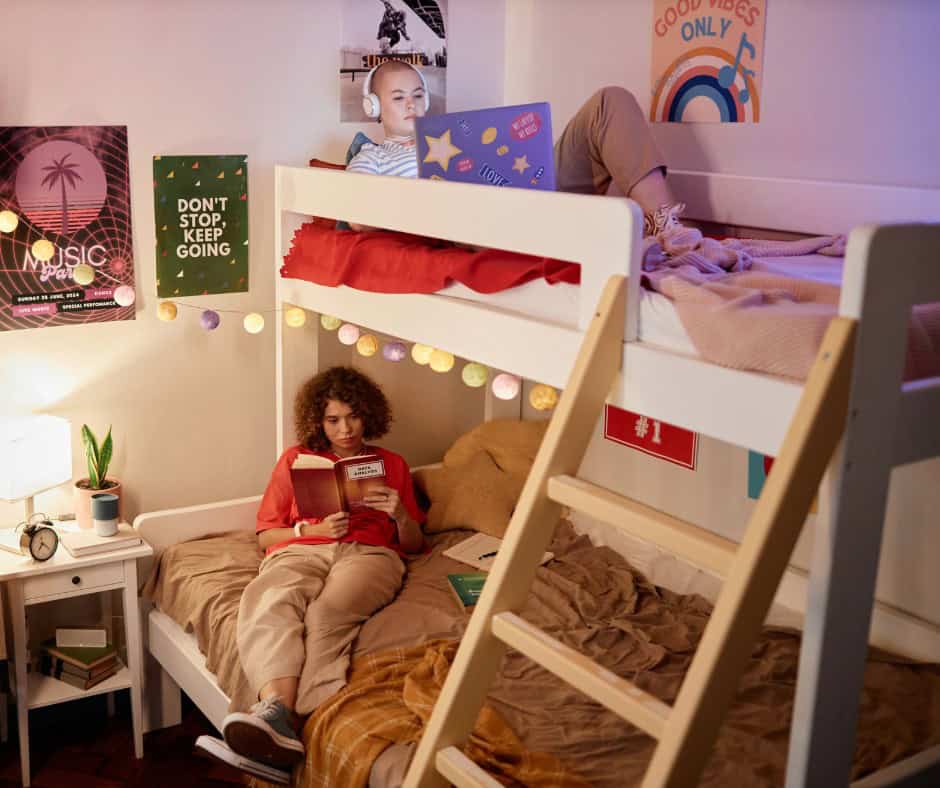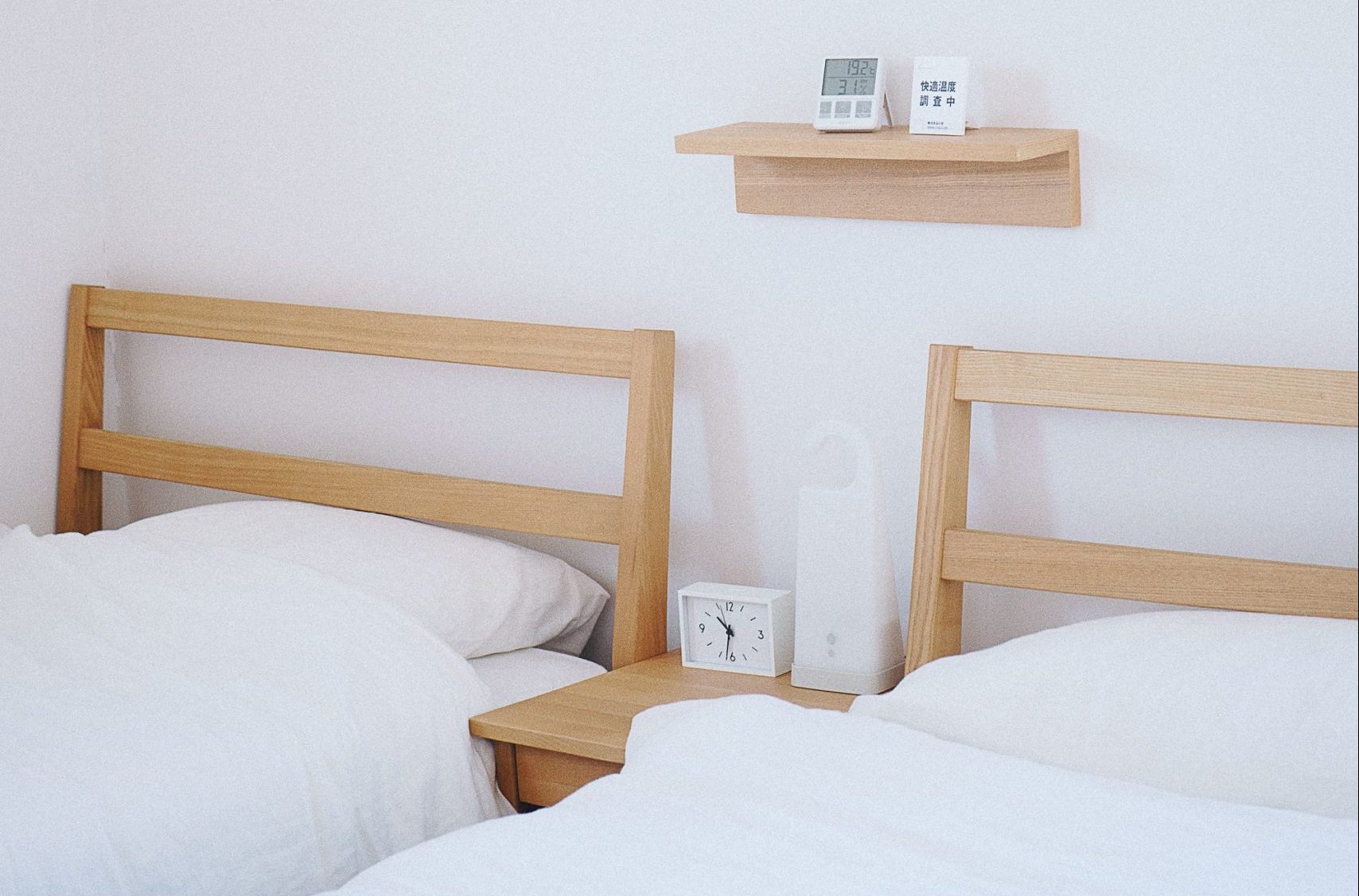Updated on April 28th, 2025
Living with a roommate in college can be amazing, but it also comes with challenges. There’s a learning curve to figuring out how to get along with a roommate, regardless of whether the students already know each other or are meeting for the first time at their respective colleges. That’s why following college roommate etiquette is so important.
College roommate etiquette helps students treat each other properly. Essentially, it’s a framework for success, ensuring your student doesn’t step on any toes while they get used to life and living with someone else.
If your student is trying to figure out how to pay for college tuition and other educational expenses, scholarships can make it easier. If you and your student want to learn more about how scholarships can help them graduate debt-free and how to find amazing scholarship opportunities, sign up for our free college scholarship webinar! Take a trip over to http://thescholarshipsystem.com/freewebinar to reserve your spot today.
If your student wants to learn more about college roommate etiquette, here are some living with college roommates tips that can make the transition easier for everyone.
Dorm Life
Living in a dorm is a new and exciting experience for many college students, offering a unique opportunity to develop important life skills and make lifelong friends. Dorm life provides a shared living space where students can connect with others, learn to navigate the college experience, and build a sense of community. College roommate etiquette tips are essential for creating a harmonious living environment, where students can feel comfortable, respected, and supported.
Understanding and respecting personal space is crucial in a dorm setting, where students share a room with one or more roommates. Establishing a roommate agreement can help prevent conflicts and ensure a positive relationship by outlining ground rules and expectations for shared living arrangements. By following these tips, college students can make the most of their dorm life experience, creating lasting memories and friendships.
How to Be a Good Roommate – The Basics
Living with a college roommate for the first time is daunting. However, it’s a lot easier if your college student also approaches the situation with the right mindset.
Mainly, treating a roommate well starts with respect, as well as a healthy dose of kindness. The arrangement is usually awkward for everyone at first. By approaching the situation calmly and being generally courteous, it’s much easier for students to navigate the adjustment period successfully.
One of the easiest ways to start things off on the right foot is to consider how any action on your student’s part impacts their roommate. It’s a great way to begin building awareness of how decisions affect both people, making it less likely that your student will do something impolite simply because they didn’t factor their roommate into the equation.
Addressing any concerns early on can prevent misunderstandings and help maintain a positive relationship.
Communication is also a major key to success. Whether it’s casual chats about how each of them is feeling and adjusting or a formal discussion about rules for the dorm, apartment, or house, talking with one another is important. It lets everyone get a gauge on the other person’s perspective, increasing the odds that they can live together harmoniously.
College Roommate Etiquette Tips for All Living Arrangements
Some roommate etiquette norms apply to college students in all living arrangements. They are simply universal, working well in dorms, apartments, or houses. As a result, they are excellent tips for anyone who is trying to figure out how to be a good roommate. Setting up living arrangements in a dorm requires careful consideration of personal space, shared spaces, and college roommate etiquette. College students should discuss and agree on a cleaning schedule to maintain a clean and comfortable living environment. Dividing up shared spaces, such as a fridge and closet, can help prevent conflicts and ensure that each roommate has their own area.
Establishing quiet hours and respecting each other’s sleep schedules is essential for maintaining a positive relationship and ensuring that each roommate gets the rest they need. Creating a roommate agreement can help outline expectations and ground rules for living together, providing a framework for resolving conflicts that may arise. By addressing these aspects early on, students can create a harmonious living environment that supports their college experience.
Here is a roommate etiquette list that applies to essentially all students.
Ask How Their Day Was
Taking a moment to ask a roommate how their day was is simply polite and can make it easier to establish some level of rapport. It also creates an opportunity for the students to touch base and potentially gather some insights about their roommate’s mood that could be helpful.
Never Make Assumptions
If your student is thinking about adding or removing anything in the shared environment, it’s best not to make assumptions about how the new person may feel about the change. Instead, they should always ask.
The same goes for borrowing a roommate or friend’s property or eating their roommate’s food. Assuming that it’s okay can lead to conflict, as your student hasn’t actually confirmed that it’s alright. By asking, they can find out how their roommate feels before anything potentially upsetting occurs.
Be Cautious About Guests
While your student may want to invite guests to visit – whether it’s for an hour, evening, overnight, or longer – that isn’t something that should be done on a whim or without their roommate’s knowledge. Guests can lead to disturbances and distractions, and they may make it harder for the roommate to enjoy or use shared areas, which is never ideal.
Usually, simply asking if their roommate minds a guest stopping by is enough to avoid significant conflicts. It gives the roommate a chance to chime in, ensuring their needs are respected.
Talk About Issues as They Arise
If something that is happening in the shared environment is significantly bothering your student, they need to speak up. By having an open and honest discussion when the problem arises, it can be addressed quickly. Students should expect to have open and honest discussions about any issues that arise to maintain a harmonious living environment. Harmful habits will be less likely to develop, and it may be easier to find a peaceful resolution.
When your student brings up the issue, they need to be polite. An accusatory tone may make their roommate defensive, potentially escalating the situation. Instead, your student should focus on the facts and how they are being impacted, all without directly placing blame. Additionally, they should be solution-oriented, concentrating more on restoring peace than dwelling on the problem.
Set Boundaries
All shared living arrangements can make it hard to feel like either party has any personal space. Often, living with a college roommate is substantially easier if everyone has a conversation early on that sets some boundaries.
For example, the students could imagine a line dividing the dorm room into two equal parts. For apartments or houses, they could set rules regarding entering each other’s bedrooms, having personal shelves in the kitchen and fridge, and designating places for toiletries in the bathrooms.
These boundaries give every other roommate space, a bit of privacy and security, ensuring that each other’s privacy is respected. As a result, it can be a great foundation for peaceful living.
Snooping Is a No-No
Since some degree of privacy is essential, one of the biggest living with roommates tips is to never, ever snoop. Students shouldn’t go through their roommate’s personal belongings or private spaces without permission.
Don’t Disturb a Sleeping Roommate
In college, sleep can be hard to come by. That’s why – unless it’s a legitimate emergency – your student shouldn’t interrupt their roommate’s time in dreamland.
Quiet hours are an essential aspect of dorm life, as they allow students to rest, study, and relax without distractions or disruptions. College students should respect each other’s sleep schedules and quiet hours, and avoid making excessive noise or disturbing their roommates. Personal space is also crucial in a dorm setting, and students should respect each other’s boundaries and private areas.
Establishing a routine for cleaning and maintaining shared spaces can help prevent conflicts and ensure a harmonious living environment. By being considerate of each other’s needs and preferences, college students can create a positive and respectful living environment, where everyone feels comfortable, supported, and respected. Understanding and adhering to these principles can make dorm life a more enjoyable and fulfilling experience for all.
Keep It Clean
Once your student is living in a shared living space, they need to do their part to keep it clean and clean up their own messes. Addressing issues like dirty dishes promptly can prevent conflicts and maintain a pleasant living environment. In many cases, students have different definitions of what “reasonably clean” means. As a result, they should have a discussion with their roommate right after move-in day and talk about how to manage cleaning tasks in community spaces, you could also create a roommate agreement. That way, everyone can get on the same page.
Navigating Conflicts and Challenges
Conflicts can arise in any living situation, but in a dorm, they can be particularly challenging due to the close quarters and shared spaces. Open communication is key to resolving conflicts and maintaining a positive relationship, and college students should strive to address issues quickly and respectfully. Setting boundaries and respecting each other’s personal space can help prevent conflicts and ensure a harmonious living environment.
College roommate etiquette 101 includes being considerate of each other’s habits, lifestyle, and preferences, and finding ways to compromise and resolve conflicts in a respectful and constructive manner. Seeking help from a resident advisor or counselor can be beneficial in resolving conflicts and providing guidance on how to maintain a positive and respectful living environment. By being proactive and considerate, students can navigate challenges effectively and maintain a peaceful living space.
Making New Friends
Living in a dorm provides a unique opportunity to make new friends and connect with others who share similar interests and experiences. College students can make an effort to get to know their roommates and other students in their dorm by attending social events, joining clubs or organizations, and participating in dorm activities. Being open-minded, respectful, and considerate of others can help build strong relationships and create a positive and inclusive living environment.
Sharing personal items, such as food or clothes, can be a great way to break the ice and build a sense of community, but it’s essential to respect each other’s boundaries and personal space. College students can also make new friends by introducing themselves to their neighbors, attending floor events, and participating in dorm-wide activities, which can help create a sense of belonging and connection. By being friendly and approachable, students can make the most of their dorm life experience.
Roommate Etiquette List for Specific Living Arrangements
Dorm Room Etiquette
Dorm rooms are unique living situations. Not only is your student sharing a space with someone else, but it’s also usually just one room. As a result, there are a few extra dorm room etiquette rules that apply.
Never Lock Your Roommate Out
If your student wants some extra privacy, they might be tempted to lock their roommate out for a bit. The issue is, your student doesn’t have sole rights to the space, so they should never prevent their roommate from having access. If your student needs alone time, they should find a personal, quiet space away from the dorm room to ensure their roommate still has access.
Talk About Sleep Schedules
When your student is living with a roommate in one room, having a conversation about sleeping schedules is a smart idea. Everyone has their own rhythm and, if your student and their roommate aren’t in alignment, they’ll need to make plans to ensure they can each get the rest they need without the whole living situation being overly inconvenient for either party. Additionally, they should be considerate of noise levels, including music, to ensure a good sleep environment for both roommates.
Changing Rules
While it may seem like an uncomfortable conversation, talking about how each of them feels about changing clothes in front of one person or another is a good idea. People have different opinions when it comes to nudity. If they want to avoid some potential awkwardness, it’s wise to talk about what is or isn’t okay in the shared space.
Off-Campus Apartment or House Etiquette
There are some situations that can occur in off-campus housing living arrangements that don’t happen in dorms, like a cleaning schedule and inviting guests. Shared bathroom etiquette is also crucial, and students should establish rules to maintain cleanliness and respect for personal items. Here are some college roommate etiquette rules for these scenarios. It’s probably a good idea to have a roommate agreement.
No Pets Unless Everyone Agrees
While the apartment or house might allow pets, students shouldn’t introduce them into a shared environment unless everyone agrees. Pets come with new risks and responsibilities, and they won’t just fall on one student.
Plus, many people have allergies, making pets effectively a health hazard. Unpleasant odors can also come with pet ownership, which many people would rather avoid.
Don’t Claim the Living Room as Personal Domain
While it might be more fun to curl up on the couch and binge-watch an entire season of their favorite show on the shared television, students shouldn’t act like the living room or other public areas are their personal domain. Everyone may want to use that space, so it’s best to come to some kind of arrangement about how it’s utilized.
Fraternity or Sorority House Etiquette
Many students are surprised when they discover that fraternity and sorority houses can be very strict. If your student is thinking about becoming a part of Greek Life, then they need to understand the etiquette of living in a fraternity or sorority house. Here are some tips that can help.
House Rules Are Mandatory
If your student lives in a fraternity or sorority house, most of the rules will be dictated by someone else.
Generally, house rules are created with safety in mind. Some may focus on keeping things peaceful. However, even if a rule seems arbitrary, students have to abide by them. Otherwise, they risk being evicted.
Parties Will Probably Happen
Many fraternities and sororities host parties at various points in the year. In some cases, parties will happen when your student needs to handle assignments, study for tests, or head to bed earlier before an early morning class or work shift. That’s just the nature of the beast.
Most people will experience these challenges, and it’s important to find ways to manage them effectively.
While your student may not have to participate in the celebrations, they are going to have to be willing to tolerate the activity. Otherwise, they may need to find alternative study spaces or invest in noise-canceling headphones if they find the revelries disruptive.
Ultimately, all of the potential living arrangements come with challenges. However, as long as your student follows traditional college roommate rules and etiquette and strives to figure out how to live with a roommate effectively, they’ll be able to adapt.
If your student is trying to figure out how to pay for college tuition and other educational expenses, scholarships can make it easier. If you and your student want to learn more about how scholarships can help them graduate debt-free and how to find amazing scholarship opportunities, sign up for our free college scholarship webinar! Take a trip over to http://thescholarshipsystem.com/freewebinar to reserve your spot today.










Leave a Reply